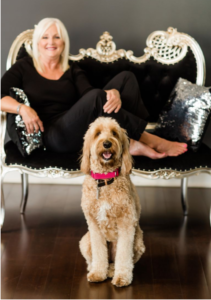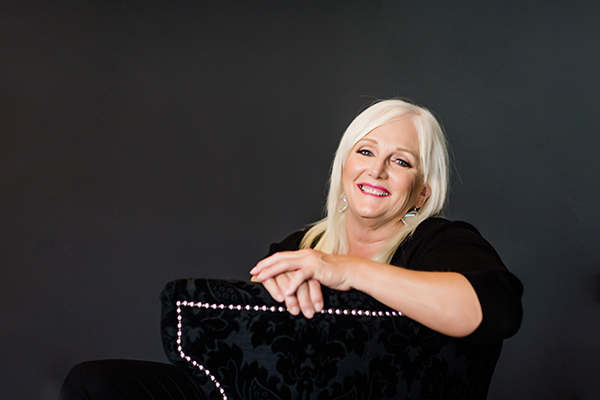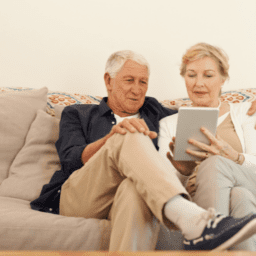Written by Davis Phinney Foundation Ambassador Julie Fitzgerald
Singles with Parkinson’s.
Singles with Parkinson’s are people who don’t have a care partner who lives with them. There are a lot of us. Some singles have been on their own for some time, while others have lost care partners as a result of divorce, the death of a partner, or many other life circumstances. Just when you thought life couldn’t throw any more curveballs, you find yourself facing Parkinson’s alone…without a safety net.
Webinars and resources designed for care partners often make me feel even more alone. I sometimes want to scream, “What about me?!” So, how do we cope and live well with Parkinson’s without a care partner? I’ve given this a lot of thought, and I’ve come up with some suggestions.
don’t let the fear of what could happen in the future keep you from living your best life now
I’m a born worrier, and I can spend my whole day worrying about the what-ifs. Or I can live in the moment. It’s a choice. You get to make it every day.
Find a good local support group
If there isn’t one in your area, start one. Spread the word through social media, your primary care physician, neurologist, or movement disorder specialist. Consider creating a meet-up group. Find a local coffee shop or restaurant where you can hold regular coffee get-togethers.
Establish a Circle of Care (COC)
 This circle could consist of friends or neighbors who agree to regularly check in on you. Your COC should be a blend of people with Parkinson’s and people who don’t have Parkinson’s. A simple phone call to check in on you is really the only commitment needed.
This circle could consist of friends or neighbors who agree to regularly check in on you. Your COC should be a blend of people with Parkinson’s and people who don’t have Parkinson’s. A simple phone call to check in on you is really the only commitment needed.
The initials of the names of friends, family, people with Parkinson’s, and members of my COC can be seen in the photo at the left. (There’s a DP in there for Davis Phinney!) I carried these stones with me on a recent trip for an entire 120-mile pilgrimage in Sicily. I placed them on the steps of the ancient ruins of The Temple of Asclepius, the birthplace of medicine and healthcare that cumulated the pilgrimage.
Use technology to your advantage
Invest in a smart watch with a cellular plan that has Emergency SOS features. Some smart watches have built-in features to detect when a user takes a fall. The watch will call 911 and send your designated contacts a text with your location, including location updates if you are transferred to the hospital.
ElderCheck Now (a great app that needs a new name!) is a free third-party app that is an excellent tool that allows those in your COC to check in on you. Check-ins can be scheduled and automated and adjusted to your preferences.
There are other health apps that can help keep track of your medication schedule and remind you when a dose is due. Search your app store for other health apps that may be useful to meet your individual needs. Set up smart home devices that can turn on and off lights and appliances. Have a smart doorbell installed so you can see who is at your door (or if the package you’ve been waiting for has just been delivered!).
Ask for and/or hire help
If housework or yard maintenance has become too much for you (or you just don’t like to clean house or mow the lawn), hire someone to take care of these things for you. Consider ordering a prepared meal service a couple of times a week to reduce the stress of cooking every day. Research service volunteer organizations in your area that may offer meal delivery, transportation, and shopping services. Your local grocery store or pharmacy may also offer curbside service or delivery.
Ensure youR home is free of safety hazards
You can work with an occupational therapist to do this, or explore handouts and worksheets like the Davis Phinney Foundation’s Home Safety Checklist.
If you have an extra bedroom, consider getting a roommate
I know, I know. You like living by yourself. You like your independence. You like your house a certain way, and the idea of a roommate makes you uncomfortable. But with a roommate, you have someone you can talk to instead of four walls; you can trade off meal preparation and household chores; and you may have the added benefit of rental income. If you don’t personally know the potential roommate, screen applicants and do a background check. You should have a rental agreement to protect yourself and specify house rules, so there are no misunderstandings later.
Consider getting a service dog or therapy dog

Although trained service dogs can be costly, getting one that is trained to serve your needs is the optimal way to go. Not all animals have the temperament to be a service dog, so be sure to research service dog organizations in your area to ensure you are using a reputable organization. Ask for references. Waiting lists, prices, and training vary. You can use services like GoFundMe to help offset the cost of getting a service dog, and for veterans, there are many organizations that offer service dogs free of charge. Costs for service dogs and their care are tax deductible.
A service animal is a dog as defined under the Americans with Disabilities Act (ADA): a service dog has be individually trained to do work or perform tasks for an individual with a disability. The task(s) performed by the dog must be directly related to the person’s disability. The ADA protects the rights of people with disabilities to access public places, including stores, restaurants, hotels and hospitals, with their service dogs.
Therapy dogs or emotional support animals play a different role than service dogs and are great company and comfort to their owners. However, therapy and emotional support dogs do not have the same guarantees to public access as service dogs. You can learn more about service animals at ada.gov.
Exercise
One of the most effective ways to live well with Parkinson’s is through exercise. It’s crucial! Many Medicare Advantage Plans include a free gym membership and going to the gym is a great way to meet people. Walk around the block. If this is too much for you, walk to the end of your driveway and back. Start small and build up.
Don’t be your own worst enemy
I’ve had to accept that I have some limitations, even though I am fiercely independent. Instead of climbing up a ladder and risk falling, I will ask for help. It isn’t a sign of weakness. It takes wisdom to realize you need help and courage to ask for it.
A happy, well-adjusted life requires balance. Don’t let your life revolve around Parkinson’s. Make Parkinson’s revolve around your life. There may be activities you enjoyed in the past but now seem impossible. Think outside the box; is there a way you can still do these activities with some modifications? Explore other activities and hobbies you find interesting. If you live in a subdivision or there is a local community recreation facility, like a YMCA, check out their events calendar and see if there are any activities or outings that appeal to you.
Above all, please, please don’t sit at home, isolated. I know it’s hard to take that first step outside your comfort zone, but for your mental and physical health, you’ve got to take the initiative. Doing so will help you live well with Parkinson’s, knowing that you are not, in fact, facing it alone.
















